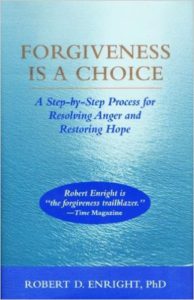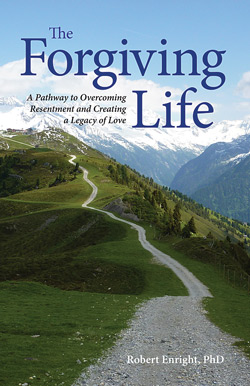Author Archive: directorifi
Forgiveness Therapy Can Work Better Than a Pill!
“Forgiveness therapy should be part of palliative care and it can work more powerfully than a pill,” Dr. Robert Enright told attendees at the Fifth Annual Healthy Aging Conference held in Madison on Sept. 9.
Dr. Enright, who pioneered the social scientific study of forgiveness beginning more than 30 years ago, has found that forgiveness increases happiness and a sense of well-being and may produce physical benefits by diminishing tensions, anger, resentment, and hurt.
“Forgiveness is surgery for a broken heart. You have the opportunity to do surgery and rehabilitation of the heart,” according to Dr. Enright. “Forgiveness offers understanding, patience, kindness, and even love to another person.”
Dr. Enright emphasized to Conference attendees that forgiveness is especially important for people to practice as they age. He said that is not only important for the health of an aging person but that older
persons also help establish their family as a “forgiving community” and teach their children and grandchildren about forgiveness.
The Forgiveness Program developed and espoused by Dr. Enright is outlined on the website of the organization he co-founded, the International Forgiveness Institute. It is detailed in several of the books he has written including:
Forgiveness Is a Choice: A Step-by-Step Process for Resolving Anger and Restoring Hope – This is a self-help book for people who have been deeply hurt by another and are caught in a vortex of anger, depression, and resentment.
The Forgiving Life: A Pathway to Overcoming Resentment and Creating a Legacy of Love – This book describes a process, followed with success by people around the world, to confront the pain; rise above it to forgive; and in so doing, loosen the grip of the depression, anger, and resentment.
8 Keys to Forgiveness – Dr. Enright’s newest book, just released this month, is a hands-on guide that walks readers through the forgiveness process in just 8 key steps.
Forgiveness Therapy: An Empirical Guide for Resolving Anger and Restoring Hope – Recently published by the American Psychological Association (APA), this manual is for Licensed Psychiatrists and Psychologists as well as other professional counselors.
The 5th Annual Healthy Aging Conference was hosted by Catholic Charities of Madison, WI – a private 501(c)(3) non-profit agency affiliated with Catholic Charities USA, the nation’s largest private network of people helping people.
Read more in the official newspaper of the Diocese of Madison, The Catholic Herald: “Catholic Charities conference focuses on healthy aging.”
A Response to Simon Doonan’s “The Healing Power of Holding a Grudge”
In the on-line site Slate, author Simon Doonan refers to what he calls “the forgiveness movement,” an obviously unpleasant image for him. For example, he thinks that forgiveness is a part of “our softy culture” that does not have the backbone to stand up against injustice.
His criticism against the virtue of forgiveness, in part, grew out of this very difficult experience: At the funeral service for his murdered friend, the one giving the talk exhorted those in attendance to begin forgiving. It was too early for such a message because forgiveness usually begins in confusion and even rage. Forgiveness is a process that takes time. This request to forgive is more an issue with the messenger, not with forgiveness itself.
Mr. Doonan gives a series of examples of what might be termed hasty forgiveness, again as a way to bolster his view that forgiveness is part of a “kumbaya” culture. Yet, again, hasty forgiveness is not what forgiveness is at its essence. To forgive in its genuine sense is to know that what happened was wrong, is wrong, and always will be wrong and from that position the forgiver gives compassion rather than hatred. It takes great inner strength to do that. To forgive is not to throw justice away, but instead to let forgiveness and the quest for justice grow up together.
Not everyone will choose to forgive, but for those who do, they must be tough-minded and know that forgiveness usually comes slowly and with much courage to try to cultivate that compassion that fights against rage in an inner battle for the person’s emotions.
Mr. Doonan’s experience with the message-bearer of forgiveness at the funeral was unfortunate. It seems to have deeply affected him because in his closing comments in his essay he refers back to this 15-year-old incident as he proclaims, “Out of respect for the memory of my pal, I will carry that rage and indignation to my grave. No forgiveness necessary.”
Rage….to his grave? Truly, I wish him well, but I am concerned for his inner world and the health of his emotions if he deliberately will nurture rage. Surely, I do not blame him for his anger, and I would like to suggest that he strive for justice toward the murderer, but he is no longer among the living. When there is no recourse to justice, is rage the only or even the best option? The murderer took a life, Mr. Doonan’s friend. He also gave birth to a rage that is promised to last a lifetime. The murderer, if his intent was to inflict suffering, is even giving this from his grave.
Rage will not make the world better. Compassion will, but it comes with a price, one of struggle and even agony, but surely not in a “softy” nor “kumbaya” way.
Robert
A Day Discussing Forgiveness in a Maximum Security Prison
In late August, my colleague, Gayle Reed, and I visited a maximun security prison to discuss forgiveness. The point was not to focus on those in prison seeking forgiveness for their crimes, but instead to help each of them to begin forgiving those who have abused them prior to their serious crimes. Many of these men have been deeply abused by others, but this becomes invisible as the focus is on their crimes and rehabilitating them for those actions.
Yet, this next point seems so little understood: Those who perpetrate crime so often have an anger, a hatred, a fury within because of the injustices they have suffered, often long before they lash out at others. If it will diminish, this kind of fury within needs major surgery of the heart. All the rehabilitation in the world, if it only focuses on their bad behavior, will do nothing to cleanse the heart of fury. Only forgiveness therapy will do that—and this idea of “only forgiveness therapy” came from one of the counselors at the prison, who supervised a forgiveness group for 6 months.
The day at the institution was special for us as we saw the men’s hearts melt at the realization (over 6 months of forgiveness therapy) that they have been deeply hurt by others, not only perpetrators of hurt onto others. They gained the insight that their own anger, rage, and fury built up to such an extent that it came roaring out onto others. As one man said, “Forgiveness is the enemy of hatred.”
Another man had this remarkable insight that anger, which is displaced onto unsuspecting other people, leads to the victim possibly passing that anger to another person, who may pass it on yet again. At some point, he reasoned, someone has to stop the passing on of anger and forgiving can do that job. He said this: “When another is in pain, they are on the hook. Then they put you on the hook. hen you put others on the hook.” He was clearly seeing that his anger was passed to his victim(s).
After our meeting with the men who took part in the 6-month forgiveness group, several of the men came up privately to me. Each one had tears in his eyes and whispered that he needs to forgive himself now. They are having a hard time living with themselves. The remorse was genuine and the pain real.
After 30 years of studying forgiveness and seeing the scientific results of a significant reduction in anger by those who forgive, I am confident that as the people in prison (both men and women) learn to forgive, their anger within the institution may diminish, making their prison home safer for everyone, including the officers and all who attend to them.
This is a new idea for corrections. May it be a standard idea within a decade.
Robert
It seems that there are many people who are angry at God. Their anger is real and something to be overcome for a better relationship with God. Do you suggest that they forgive God? In my understanding, the loving and holy God cannot do anything unjust, so it is challenging for me to conceptualize how people might be forgiving God. However, their anger is real and something to be resolved—that’s the key and real issue stimulating the idea of forgiving God. Thank you for your wisdom.
The late Lewis Smedes in his book, Forgive and Forget, suggested that God is big enough to take our resentment and our forgiving. I am a great admirer of Dr. Smedes, but I think he got this one wrong. As you say, a perfect God cannot be unjust. If we presume otherwise, this can open up many errors in theology. For example, God is imperfect in this scenario and so why follow the imperfect? God is capable of sin in this scenario. Would you want to worship a sinful being?
Instead of forgiving God, I recommend working on acceptance—-acceptance of God’s will. Sometimes this involves suffering, but out of suffering can come strength, patience, and a deep empathy for those who suffer.
As I was thinking about forgiving people who have hurt me, I began to realize that sometimes the central person I have to forgive is myself. Is it acceptable to consider forgiving myself?
Yes, and the process of forgiving yourself is described in detail in my book, 8 Keys to Forgiveness (W.W. Norton & Company, 2015, available at amazon.com). The difference between forgiving others and forgiving yourself is that in forgiving the self, you also need to go to those who were hurt by your actions and ask for forgiveness. So, you forgive (the self) and seek forgiveness (from others) in self forgiveness.







